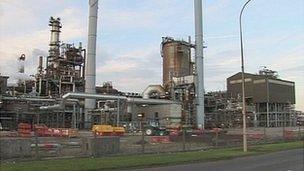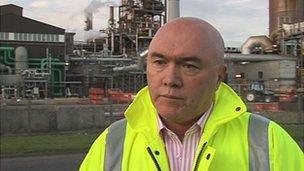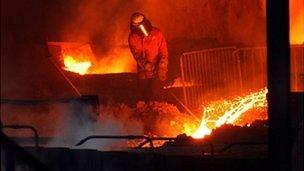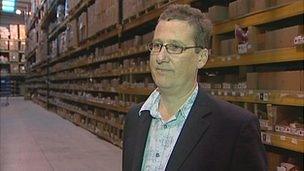Industry warns carbon tax could cause huge job losses
- Published
- comments

Chemical companies like Lotte in Teesside face huge extra costs because of the government's plans
One of the measures tucked away in last spring's budget was a plan that will see some energy producers and industry pay more for every tonne of carbon dioxide they produce.
It was - boasted Chancellor George Osborne - a chance for Britain to lead the world on the environment.
That was his intention anyway. But now he's been warned that it could cost thousands of jobs, and do almost nothing to save the planet.
Global warming
What he announced was something called a carbon floor price.
All producers of greenhouse gases have to buy permits for the carbon dioxide they put out.
That's supposed to encourage them to cut carbon emissions, and therefore help the fight against global warming.
But at the moment those permits for carbon are relatively cheap because they are traded on the open market. Companies can currently pay as little as £9 per tonne.
What George Osborne plans is to set a minimum price per tonne for those permits.
That carbon floor price will have to be at least £16 per tonne by 2013, and £30 per tonne by 2020.
His aim is an apparently laudable one.
Low carbon firms
By setting a minimum price, he was hoping to introduce some certainty and stability.
He hoped that would provide ideal conditions for investment in low carbon forms of energy and encourage businesses to cut their emissions.

Lotte Director Mark Kenrick says chemical companies will close and shed jobs if they are forced to pay more for their carbon emissions
But it also looks likely to cause a big cut in jobs amongst the biggest energy users.
It is a measure that will only apply in Britain, and not in the rest of Europe or the world.
Companies then could pay more for doing business here than elsewhere.
There already appear to be some casualties.
Alcan runs an aluminium smelter in Northumberland, but has recently announced that it will look to sell or shut the plant.
That could cost 600 jobs, and the company says the new carbon floor price is a factor as it uses large amounts of energy to produce the metal.
It believes the government's plans could cost it £50m, wiping out its profits and making the business unsustainable.
Extra costs
And other industries are also worried.
The chemical industry in the North East employs 40,000 people directly, and supports 280,000 other jobs.
But it's also another big user of energy, and the carbon floor price will cost firms millions.
One worried company is Lotte, which is based on the giant Wilton complex in Teesside.
It employs 170 people, producing plastic for bottles.

Steel is another industry that could suffer because it uses so much energy
But it will face a big extra bill because of the carbon floor price.
Director Mark Kenrick said: "The fear is that the added costs make us increasingly uncompetitive against other international businesses that do not have the same pressures.
"The government is trying to force firms to make changes much faster than is possible, and more quickly than the competition, and we will clearly be penalised.
"This could mean the industry is unable to compete. That means closures, and that means job losses."
Losing jobs
And companies are warning that the measure won't help the environment either.
Instead, they say it will just push production out of Britain and into countries which don't impose the same kind of levy.
So carbon dioxide emissions remain the same, but the UK loses jobs.
And it's not just chemicals that will be affected.
Thai company SSI will start making steel again in Redcar in December, but that's another energy-intensive industry which will face an extra bill.
Middlesbrough South and East Cleveland Labour MP Tom Blenkinsop, external fears if the plans aren't changed, steel-making jobs could be lost too.
He said: "SSI have started the process of taking workers back on site. What we don't want to do is create more uncertainty in the steel industry by imposing these extra costs."
But the government does now seem to be prepared to listen.
George Osborne, external has said he will try and find a way of compensating energy intensive industries in his Autumn Statement.
We don't know how, or by how much, but industry is waiting to see whether it will offer a lifeline.
Green concerns
But there are those who think the government should resist the pressure.
The Green Party, external is largely in favour of setting a carbon floor price.
It would like it to be higher, but it sees its introduction as a good first step.

Green Party member and businessman Andy Redfern believes the government should resist pressure to compensate companies
And it says compensating the companies who would be the most affected would defeat the point of it.
Andy Redfern runs a company in Gateshead which supplies ethical and environmentally friendly goods, but he's also a Green Party member.
He said: "Why bother introducing a penalty for carbon-producing industries if you are just going to compensate companies affected by it.
"We are keen to see this tax stick because it will encourage companies to be more inventive and think of other ways they can reduce their carbon output.
"Ultimately, the polluter needs to pay and the pollution we get from these facilities is very large."
The Chancellor faces a dilemma then. It would be a brave man who would risk seeing thousands of jobs lost at a time when it's supposed to be pushing relentlessly for growth.
But his government has also promised to be the greenest ever.
Can it really do both, or will it have to compromise on one or other of those aims?